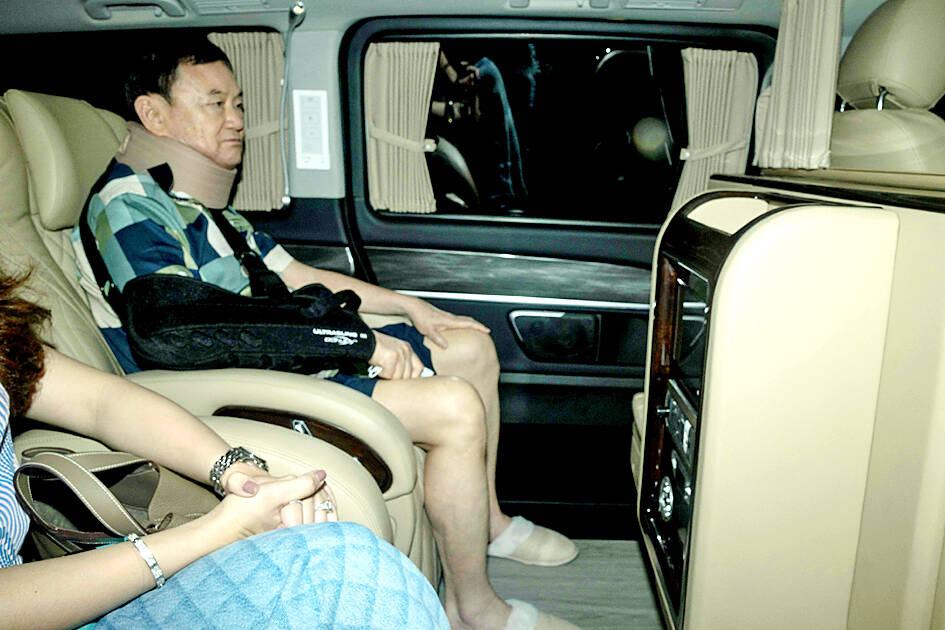Billionaire former Thai prime minister Thaksin Shinawatra was yesterday released on parole after six months in detention, his first day of freedom in his homeland 15 years after fleeing in the wake of his overthrow in a military coup.
Thailand’s best-known and most polarizing premier, Thaksin has loomed large over politics during the years spent mostly in self-imposed exile to dodge jail for abuse of power, charges he maintained were cooked up by the country’s old guard.
The 74-year-old tycoon, whose family’s party is back in power, was granted parole despite having not spent a single night in prison for a sentence that had in August last year been commuted from eight years to one by the Thai king.

Photo: AFP
Due to health reasons, Thaksin was incarcerated in a luxury wing of a hospital, from which he made an uncharacteristically low-key departure before dawn yesterday, slipping out in a convoy of tinted-windowed vehicles that was chased by a phalanx of media that had gathered overnight.
Wearing a checked shirt, protective mask and with his arm in a sling, Thaksin was pictured in the vehicle beside youngest daughter Paetongtarn Shinawatra, leader of the ruling Pheu Thai party, and arrived at his Bangkok residence 25 minutes later.
Thaksin made a dramatic return by private jet in August last year to a rapturous welcome from supporters, before being escorted away by police who saluted him as he arrived.
His homecoming coincided with ally Srettha Thavisin being elected prime minister that same day by a parliament stacked with lawmakers loyal to the military, prompting speculation Thaksin had negotiated a deal with the powerful enemies who toppled three Shinawatra governments in eight years.
His allies have denied any such pact.
Thaksin’s return and early release has been controversial, with widespread skepticism about the extent of his health problems and his relatively mild punishment.
“Very sick? Parole? What disease?” Thai Senator Somchai Swangkarn wrote on social media with pictures of Thaksin leaving hospital and the hashtag “RIP Thai justice.”
The opposition Move Forward Party said it was undeniable Thaksin had received unfair treatment in the past, but providing justice to him “should not be in a way that emphasizes double standards ... or gives certain individuals privileges above the law.”
Thaksin’s release had long been anticipated and the focus will now shift to whether the tycoon stays true to his word regarding his retirement.
“He certainly will have some influence. Now, to what extent? He’s not calling the shots the same way he used to,” political analyst Thitinan Pongsudhirak said.
“Thaksin will be on a leash because the newly aligned centers of power, they don’t trust him,” he said. “I’m sure that the back channels will make it very clear that if he reneges on the deal, there’ll be trouble.”

Kehinde Sanni spends his days smoothing out dents and repainting scratched bumpers in a modest autobody shop in Lagos. He has never left Nigeria, yet he speaks glowingly of Burkina Faso military leader Ibrahim Traore. “Nigeria needs someone like Ibrahim Traore of Burkina Faso. He is doing well for his country,” Sanni said. His admiration is shaped by a steady stream of viral videos, memes and social media posts — many misleading or outright false — portraying Traore as a fearless reformer who defied Western powers and reclaimed his country’s dignity. The Burkinabe strongman swept into power following a coup in September 2022

‘FRAGMENTING’: British politics have for a long time been dominated by the Labor Party and the Tories, but polls suggest that Reform now poses a significant challenge Hard-right upstarts Reform UK snatched a parliamentary seat from British Prime Minister Keir Starmer’s Labor Party yesterday in local elections that dealt a blow to the UK’s two establishment parties. Reform, led by anti-immigrant firebrand Nigel Farage, won the by-election in Runcorn and Helsby in northwest England by just six votes, as it picked up gains in other localities, including one mayoralty. The group’s strong showing continues momentum it built up at last year’s general election and appears to confirm a trend that the UK is entering an era of multi-party politics. “For the movement, for the party it’s a very, very big

ENTERTAINMENT: Rio officials have a history of organizing massive concerts on Copacabana Beach, with Madonna’s show drawing about 1.6 million fans last year Lady Gaga on Saturday night gave a free concert in front of 2 million fans who poured onto Copacabana Beach in Rio de Janeiro for the biggest show of her career. “Tonight, we’re making history... Thank you for making history with me,” Lady Gaga told a screaming crowd. The Mother Monster, as she is known, started the show at about 10:10pm local time with her 2011 song Bloody Mary. Cries of joy rose from the tightly packed fans who sang and danced shoulder-to-shoulder on the vast stretch of sand. Concert organizers said 2.1 million people attended the show. Lady Gaga

SUPPORT: The Australian prime minister promised to back Kyiv against Russia’s invasion, saying: ‘That’s my government’s position. It was yesterday. It still is’ Left-leaning Australian Prime Minister Anthony Albanese yesterday basked in his landslide election win, promising a “disciplined, orderly” government to confront cost-of-living pain and tariff turmoil. People clapped as the 62-year-old and his fiancee, Jodie Haydon, who visited his old inner Sydney haunt, Cafe Italia, surrounded by a crowd of jostling photographers and journalists. Albanese’s Labor Party is on course to win at least 83 seats in the 150-member parliament, partial results showed. Opposition leader Peter Dutton’s conservative Liberal-National coalition had just 38 seats, and other parties 12. Another 17 seats were still in doubt. “We will be a disciplined, orderly